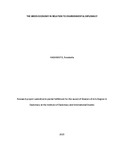| dc.description.abstract | This project critically examines whether or not the Green Economy can be an effective tool in
promoting diplomatic relations among states despite the various socio-economic challenges
they face. The objectives of the study is to understand what the concept of the Green Economy
means and how would it promote the new way of doing business as opposed the more “brown
economy”. It also aims at understanding what role the Green Economy plays in environmental
diplomacy as it is concerned with promoting development whilst protecting the environment.
This will naturally have challenges and so the study analyses some of these challenges not only
with the concept but how it affects environmental diplomacy. This is examined with a realist
point of view whereby scholars such as Machiavelli and Morgenthau argue that states will do
anything to survive and get ahead in the international community. Not only do such
interactions provide a platform on which states can outdo each other but it is also a way in
which they can come together to ensure that their interests are met. Most of the research
undertaken was from published books, articles, journals as well as relevant news articles. From
this project, it is clear to see that the states are working together to preserve themselves
economically as well as in terms of development. The Green Economy, while a great idea is
difficult in some aspects to implement. This is because the world economy is a competitive and
cutthroat arena in which countries feel the pressure from their citizens as well as the rest of the
world to do better or in some cases to be the best. Many are reluctant to turn to a “green” way
of soing things simply because it will push them back in terms of development. Some of the
developing countries feel that they are on the short end of the stick whereby they are being
forced to slow down the rate at which they are developing. This creates tension, which hinders
environmental diplomacy to thrive. Based on these findings it is recommended that the Green
Economy be more inclusive in terms of implementation as well as consider indigenous methods
of environmental preservation that could bring about a more successful way of “selling” the
Green Economy to the locals who will in turn push the policy makers to implement it. The
Green Economy is a great premise to solving the world’s environmental as well as
developmental challenges, but more can be done to refine this concept to make the goals a
reality. | en_US |

